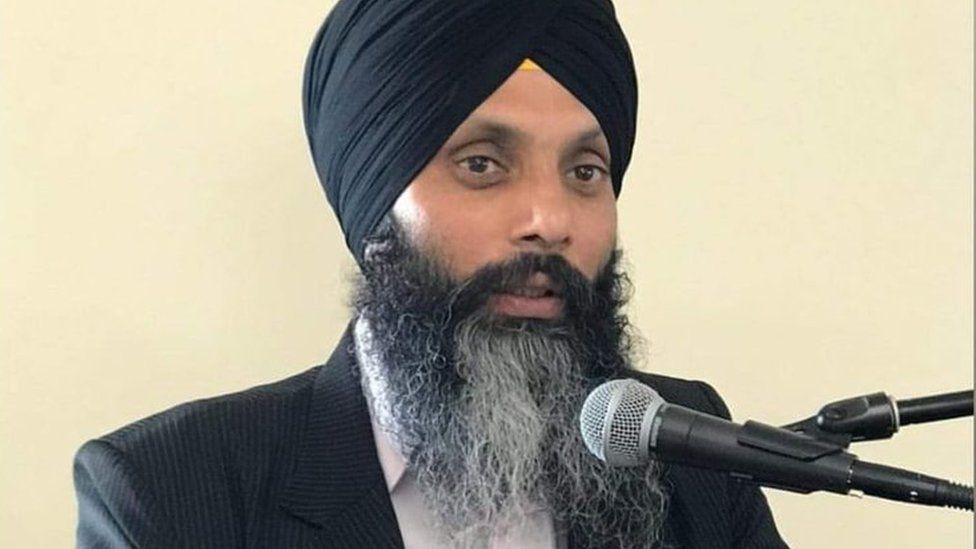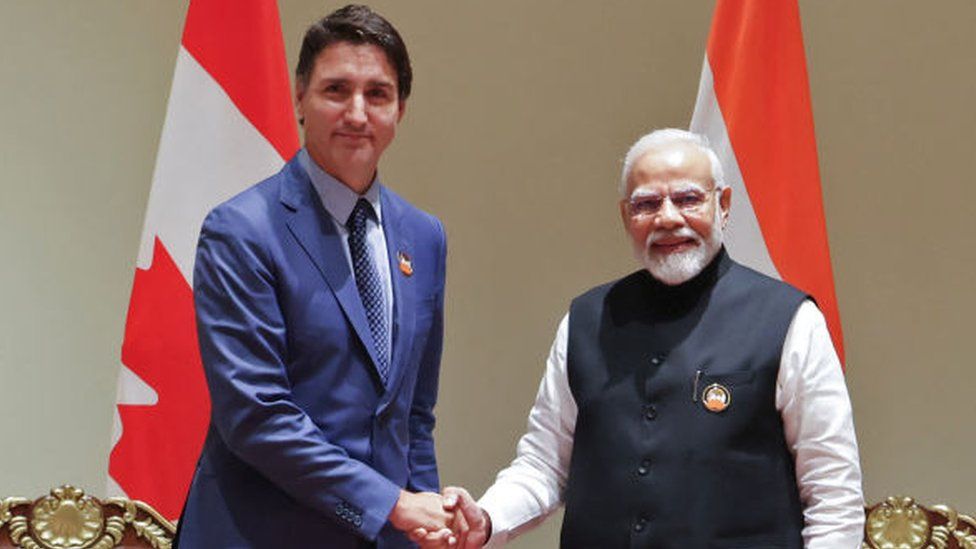Watch: Trudeau accuses India in killing of Canadian Sikh
Canada has accused India of involvement in the killing of a Canadian Sikh leader, an allegation strongly denied by Delhi.
On Monday PM Justin Trudeau said Canada was looking at “credible allegations potentially linking” the Indian state to Hardeep Singh Nijjar’s murder.
Mr Nijjar was was shot dead outside a Sikh temple on 18 June in Canada.
India has expelled a Canadian diplomat after Canada expelled Indian diplomat Pavan Kumar Rai over the case.
Mr Nijjar, 45, was shot dead in his vehicle by two masked gunmen in the busy car park of the Guru Nanak Sikh Gurdwara in Surrey, a city about 30km (18 miles) east of Vancouver.
A prominent Sikh separatist leader in the western-most province of British Columbia, he publicly campaigned for Khalistan – the creation of an independent Sikh homeland in the Punjab region of India.
Sikhs are a religious minority that make up about 2% of India’s population. Some groups have long called for a separate homeland for Sikhs.
In the 1970s Sikhs launched a separatist insurgency in India which saw thousands killed before it was quelled the following decade.
Since then, the movement has been mostly limited to countries with large Sikh populations such as Canada and the UK. There are an estimated 1.4 to 1.8 million Canadians of Indian origin and the country has the largest population of Sikhs outside Punjab.
India has in the past described Mr Nijjar as a terrorist who led a militant separatist group – accusations his supporters say are unfounded. They say he had received threats in the past because of his activism.

Mr Trudeau said in parliament on Monday that he had raised the issue of Mr Nijjar’s killing with Indian Prime Minister Narendra Modi at the recent G20 summit in Delhi.
“Any involvement of a foreign government in the killing of a Canadian citizen on Canadian soil is an unacceptable violation of our sovereignty,” he told lawmakers.
On Tuesday, India’s ministry of external affairs said that it “completely rejected” Mr Trudeau’s claims which it described as “absurd” and politically motivated.
“We are a democratic polity with a strong commitment to rule of law,” the ministry said in a statement.
It accused Canada of providing shelter to “Khalistani terrorists and extremists” who threaten India’s security.
“We urge the government of Canada to take prompt and effective legal action against all anti-India elements operating from their soil,” the ministry said.
After Mr Trudeau’s comments, several large posters and tributes to Mr Nijjar were visible at the Guru Nanak Sikh Gurdwara in Surrey.
Moninder Singh, a spokesman for the British Columbia Sikhs Gurdwaras Council, told the BBC that the community appreciated “that at least the prime minister stood up and acknowledged that there is a foreign hand behind this murder”.
Other Sikh groups in Canada, including the World Sikh Organisation, welcomed the prime minister’s statement, saying Mr Trudeau confirmed what was already widely believed in the community.

Mr Trudeau’s remarks come after his tense meeting with Mr Modi last week during the G20 summit in India where Mr Modi accused Canada of not doing enough to quell “anti-India activities of extremist elements”, referring to the Sikh separatists.
Canada also recently suspended negotiations for a free trade agreement with India. It gave few details on why, but India cited “certain political developments”.
Mr Nijjar is the third prominent Sikh figure to have died unexpectedly in recent months.
In the UK, Avtar Singh Khanda, who was said to be the head of the Khalistan Liberation Force, died in Birmingham in June. West Midlands police told the BBC they were not opening an investigation.
“Following speculation surrounding the death of Avtar Singh Khanda, a thorough review was undertaken by West Midlands Police which concluded that there were no suspicious circumstances,” the force said.
Paramjit Singh Panjwar, who was designated a terrorist by India, was shot dead in May in Lahore, the capital of Pakistan’s Punjab province.
The backdrop to the tension between Delhi and Ottawa is the increasing pressure the Indian administration has put on governments of three countries with sizeable Sikh populations: Canada, Australia and the UK.
It has openly said that a failure to tackle what it calls “Sikh extremism” would be an obstacle to good relations.
On Tuesday, the White House said it was “deeply concerned” about Mr Trudeau’s allegations.
“We remain in regular contact with our Canadian partners. It is critical that Canada’s investigation proceed and the perpetrators be brought to justice,” White House National Security Council spokesperson Adrienne Watson said.
Additional reporting from Nadine Yousif, Aleem Maqbool and Gerald Narciso

